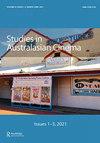Don’t call me grandma: how to write formidable country women over the age of 65 as lead protagonists in an Australian feature film
IF 0.7
0 FILM, RADIO, TELEVISION
引用次数: 1
Abstract
ABSTRACT In recognition of the lack of female representation on screen, in 2015 Screen Australia launched the Gender Matters Program. However, it did not address the lack of representation of older women (defined as over 40 or ‘a woman of a certain age’). The research question addressed by this article is how to write older female characters over the age of 65 who are tough, capable, and complex. The research methodology combined Schon’s reflective practice theory, and Denscombe’s action research model with Batty and Baker’s practice-led research principle to create a feature film screenplay as the research artefact. The research strategy encompassed a broad approach comprising a field excursion to Winton to interrogate place and theme and a comprehensive review of literature in the field of gender, screenwriting, and female representation. The investigation revealed that in feature films there are a lack of complex female characters who are leaders in their community, who determine their own destiny and are still considered young at 40 years of age. A set of 10 guiding principles were identified which shaped the writing of the older characters in the research artefact, the feature film screenplay Myrtle and Ivy. Myrtle and Ivy seeks to redress this lack of older female representation to depict complex, tough, and capable characters.不要叫我奶奶:如何在澳大利亚故事片中写出65岁以上令人敬畏的乡村女性作为主角
摘要为了认识到女性在银幕上的代表性不足,screen Australia于2015年启动了“性别问题计划”。然而,它并没有解决老年妇女(定义为40岁以上或“某个年龄的妇女”)缺乏代表性的问题。本文提出的研究问题是如何写出65岁以上坚韧、能干、复杂的年长女性角色。研究方法结合了Schon的反思实践理论、Denscombe的动作研究模式和Batty和Baker的实践主导的研究原则,创造了一个故事片剧本作为研究对象。研究策略包括一种广泛的方法,包括前往温顿实地考察地点和主题,以及对性别、编剧和女性代表领域的文献进行全面回顾。调查显示,在故事片中,缺乏复杂的女性角色,她们是社区的领导者,决定着自己的命运,在40岁时仍然被认为是年轻的。确定了一套由10条指导原则组成的指导原则,这些指导原则塑造了故事片剧本《桃金娘与艾薇》中老角色的写作。《桃金娘与艾薇》试图纠正这种缺乏年长女性形象的现象,以描绘复杂、坚韧和能干的角色。
本文章由计算机程序翻译,如有差异,请以英文原文为准。
求助全文
约1分钟内获得全文
求助全文

 求助内容:
求助内容: 应助结果提醒方式:
应助结果提醒方式:


